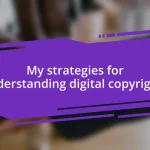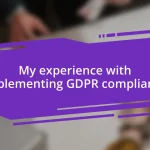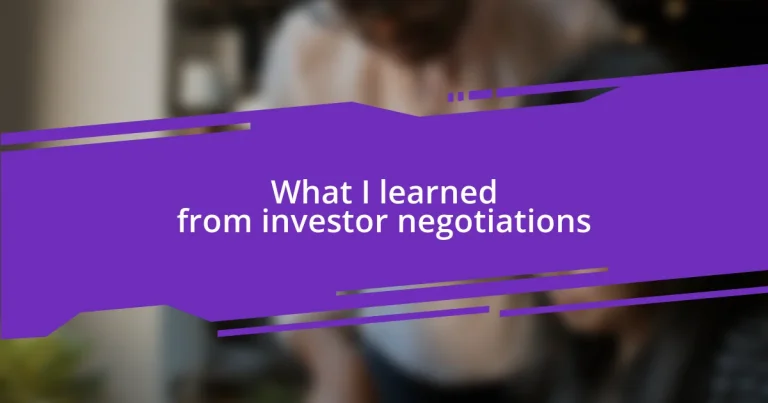Key takeaways:
- Building rapport through personal connections and active listening enhances negotiation outcomes and fosters trust.
- Handling objections with empathy and openness turns potential conflicts into collaborative discussions.
- Flexibility in strategy and the ability to read emotional cues are crucial for successful negotiations and closing deals.
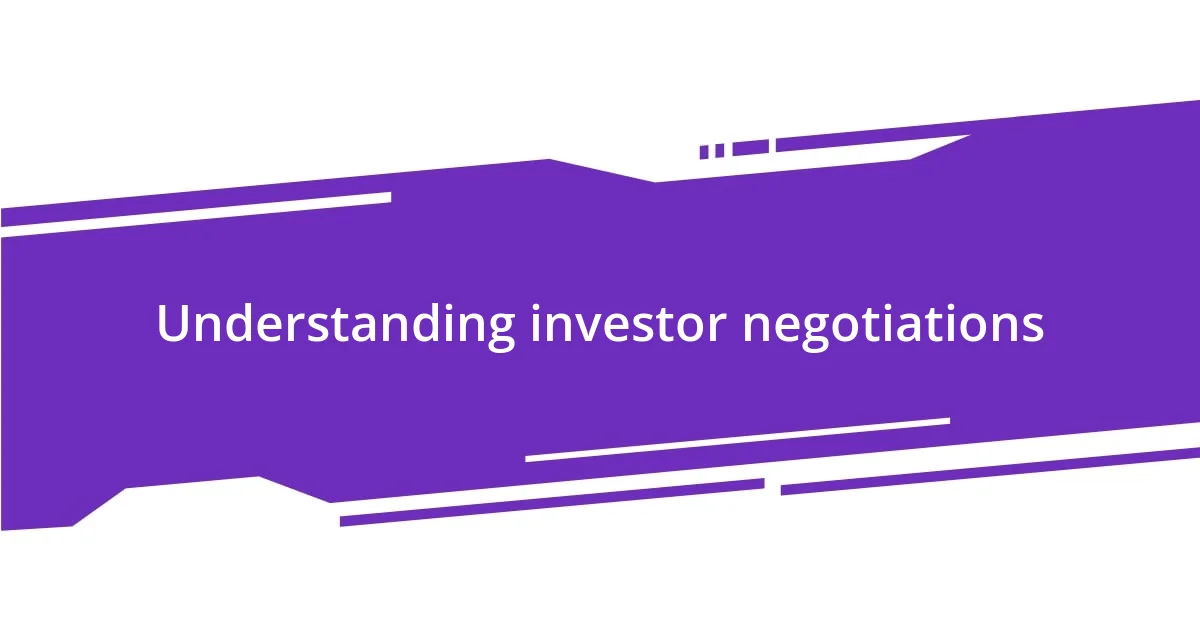
Understanding investor negotiations
Understanding investor negotiations is more than just numbers and terms; it’s about building relationships and trust. I remember my first negotiation vividly. I approached it thinking it was purely transactional, but quickly learned that establishing rapport was just as important as presenting my business plan. How often do we underestimate the power of connection in a boardroom?
As discussions unfold, the emotional landscape of negotiations can shift dramatically. One moment there’s excitement about the potential partnership, and the next, anxiety when differing opinions arise. I’ve felt that rush—when a prospect just doesn’t see the value I see. It’s in those moments that I had to step back and ask myself: what’s truly at stake here, beyond the finances?
I’ve also come to realize that being prepared is crucial, not just with facts but also with my mindset. For instance, I once walked into a meeting fully armed with data, only to get distracted by the investors’ unexpected questions. It taught me to anticipate not only their queries but also the emotional undertones behind them. Recognizing the human element in negotiations has transformed how I approach these high-stakes conversations. What about you? How have emotions played a role in your negotiations?
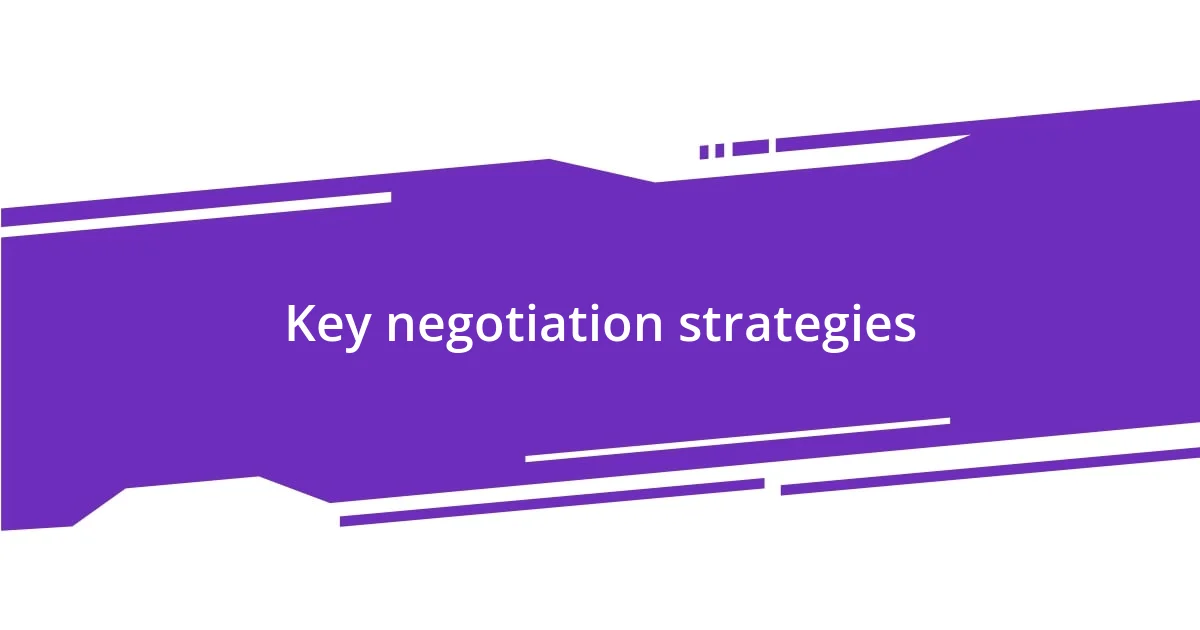
Key negotiation strategies
When it comes to negotiation strategies, having a clear game plan is essential, yet flexibility is equally important. In one instance, I entered a negotiation with a rigid set of objectives, but as the conversation unfolded, I realized that some of my initial goals weren’t as critical as I thought. This taught me that open-mindedness could lead to unexpected opportunities. Allowing room for adjustments can help build trust and foster collaboration—qualities that are vital in any negotiation.
Here are some key strategies that have been effective for me:
- Active Listening: Focus on understanding the other party’s needs and concerns; it shows respect and opens the door for genuine dialogue.
- BATNA (Best Alternative to a Negotiated Agreement): Know your alternatives. This knowledge empowers you and can shift the negotiation power in your favor.
- Building Rapport: Engage in small talk or find shared interests to develop a connection; it sets a positive tone for the negotiation.
- Staying Calm Under Pressure: I remember a heated moment where taking a deep breath changed my approach. It helped diffuse tension and fostered a more productive discussion.
- Exploring Mutual Gains: Shift the focus from a win-lose mindset to discovering solutions that benefit both parties. In my experience, this creates a more satisfying resolution for everyone involved.
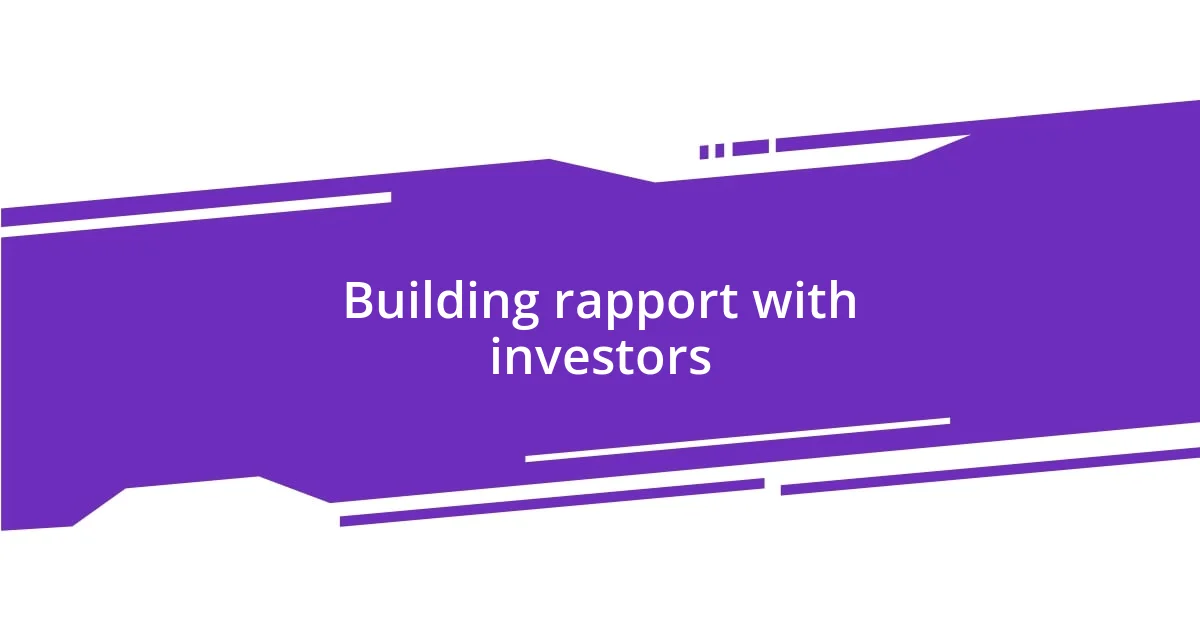
Building rapport with investors
Building rapport with investors is all about connecting on a human level. I learned this during a negotiation when I noticed a shift in the mood as I shared a personal story related to my business journey. Suddenly, the room felt warmer, and I could see the investors engaged not just with my data but with me as a person. It’s amazing how a simple story can create a sense of shared experience.
I vividly recall a moment when I had just gotten the investors to laugh with a light-hearted joke about the challenges of entrepreneurship. That small interaction broke the ice and made it easier to discuss serious topics afterward. Humor is a powerful tool; it can transform the atmosphere from stiff and formal to open and collaborative. Have you ever tried using humor to lighten the mood during a tense negotiation?
Investors are often inundated with pitches, so building rapport isn’t just nice; it’s essential. I remember strategically reaching out to an investor before our formal meeting to discuss a shared interest in community development. By the time we met, we were not just strangers but had cultivated a connection rooted in mutual values. This foundation made negotiations smoother and more productive, proving that relationships can significantly enhance business outcomes.
| Strategy | Description |
|---|---|
| Active Listening | Focus on understanding and acknowledging investor needs to foster dialogue. |
| Personal Anecdotes | Share relevant personal stories to create emotional connections. |
| Shared Interests | Identify common ground to establish rapport before diving into business matters. |
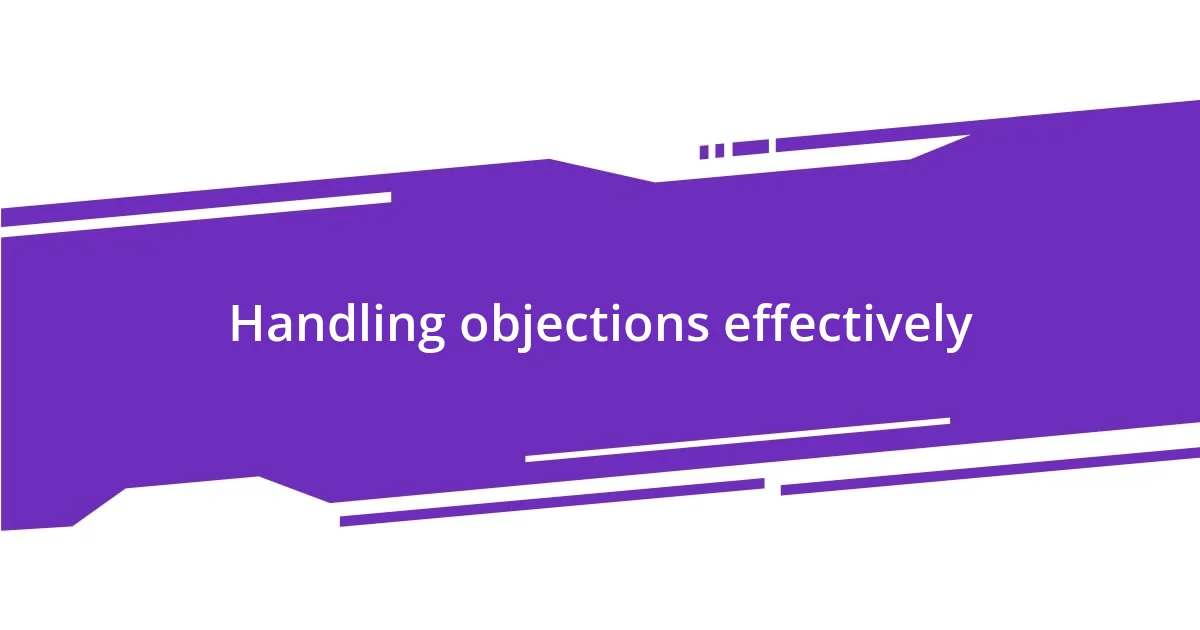
Handling objections effectively
Handling objections effectively is a skill I’ve honed over time, and one technique that works wonders is addressing them as soon as they arise. I remember a negotiation where an investor expressed concerns about our projected growth. Instead of sidestepping the issue, I acknowledged their worry and presented data from similar companies that had thrived. This approach turned a potential roadblock into a collaborative discussion.
It’s crucial to remain calm and composed when facing objections. During one particularly tense meeting, an investor challenged our financial forecasts. Instead of getting defensive, I took a moment to breathe and then asked, “What specific aspects of our projections concern you the most?” This simple question not only demonstrated my willingness to engage with their doubts but also opened up a dialogue that ultimately led us to resolve the issues together.
Empathy plays a pivotal role in overcoming objections, too. I learned this firsthand when a potential investor hesitated due to their previous experiences with startups. I shared how I’ve faced similar challenges and the lessons I’ve learned. By relating to their concerns, I could transform skepticism into trust. Have you ever noticed how vulnerability can shift the tone of a conversation? It’s often a game-changer.
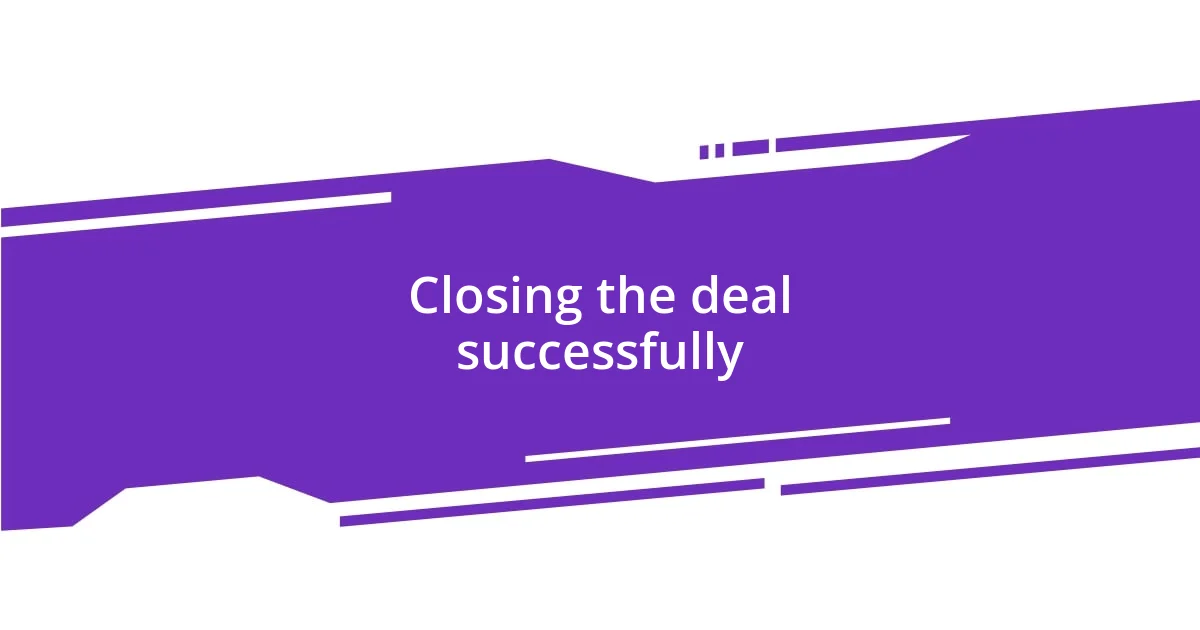
Closing the deal successfully
Closing a deal successfully hinges on clarity and confidence during the final stages of negotiation. I recall a pivotal moment when I clearly outlined the terms we had agreed upon, ensuring everyone was on the same page. That simple act not only solidified our agreement but also left little room for misunderstandings. Have you ever experienced that moment of clarity where everything just clicks?
Another key aspect is the importance of timing. There was an instance when I felt the energy in the room shift, signaling it was time to close. I confidently stated my offer, and before the investors could hesitate, I emphasized the unique opportunity we were presenting. Knowing when to strike while the iron is hot can be the difference between walking away with a deal or missing out entirely.
Trusting your intuition is essential when closing a deal. During one negotiation, I sensed a small hesitation from my counterpart just as we approached the final agreement. Instead of rushing ahead, I paused and asked what was holding them back. This pause allowed us to address a lingering concern, which ultimately led to a stronger commitment from the investors and a solidified partnership. Wouldn’t you agree that sometimes, a little patience can open doors to unexpected outcomes?
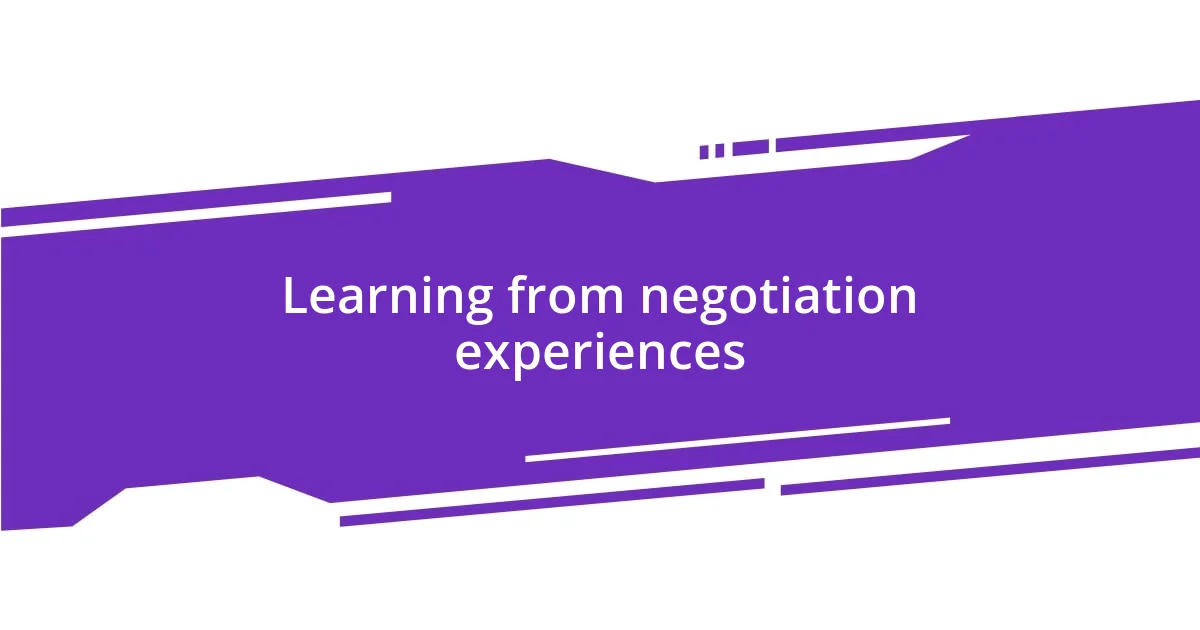
Learning from negotiation experiences
Learning from negotiation experiences is often about reflecting on what worked and what didn’t. I remember one negotiation where I felt over-prepared, anticipating every possible question. However, when the investor asked something completely unexpected, I froze momentarily. This taught me the value of staying adaptable, reminding me that no matter how much I prepare, genuine conversations can take unforeseen turns. Have you ever found yourself caught off guard in a discussion?
Another important lesson stemmed from the power of active listening. In one particularly enlightening negotiation, I realized that the more I listened to the investor’s vision, the better our dialogue flowed. By simply repeating back what I heard, I made them feel valued and respected. It transformed our conversation into a fruitful exchange rather than just a transaction. Isn’t it fascinating how engagement can lead to new insights and strengthen relationships?
I’ve also learned that negotiating isn’t just about the numbers; it’s about building connections. During one late-night negotiation, we started discussing our personal experiences, which broke down barriers. It reminded me that when people relate on a human level, it fosters trust and opens doors to collaboration. Have you ever noticed that a simple personal touch can change the atmosphere in a room? It certainly can make all the difference in creating a win-win scenario.
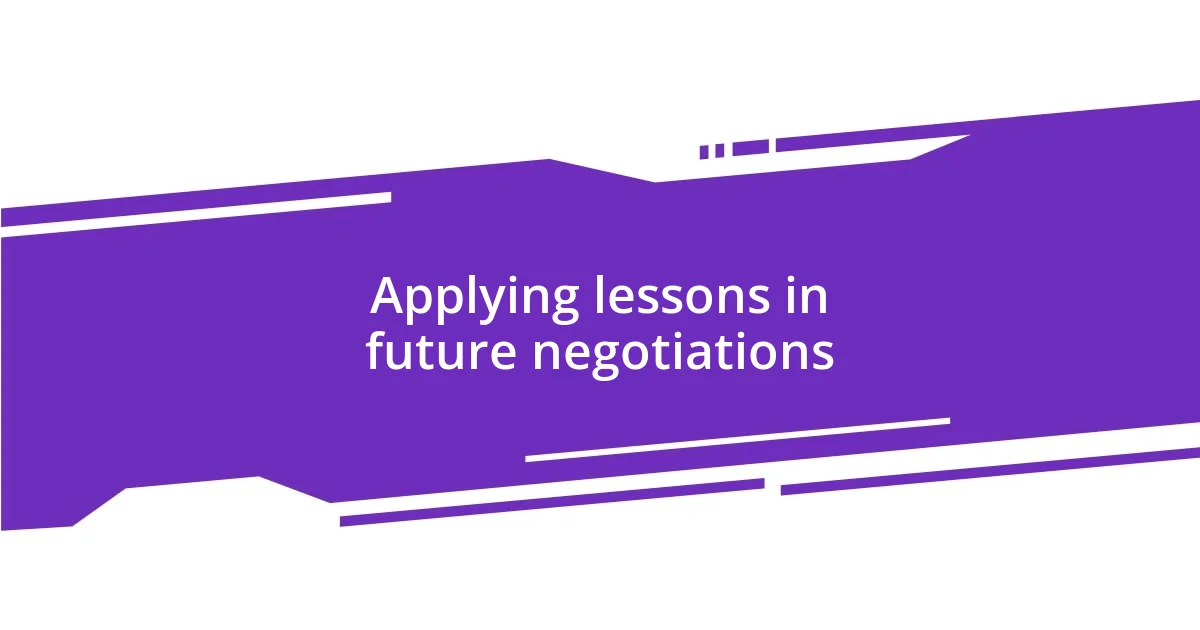
Applying lessons in future negotiations
Applying the lessons learned from previous investor negotiations shapes how I approach future discussions. For instance, I’ve realized that my emotional state plays a crucial role in negotiations. I once walked into a high-stakes meeting feeling anxious, and that tension was palpable. It taught me the importance of approaching negotiations with a calm, open mindset. Have you ever noticed how your emotions can influence the atmosphere in a room?
In practical terms, I now prioritize preparation, but in a more flexible way. I’ve come to believe that while it’s vital to have key points ready, I should also leave space for spontaneous dialogue. During one negotiation, I had a solid pitch in mind, but the real breakthrough happened when I veered off-script to discuss mutual interests. That moment not only engaged the investors but also created a sense of collaboration that pulled us closer together. Can you recall a time when focusing on shared priorities led to a more productive conversation?
Moreover, leveraging body language has become an essential tool in my negotiation toolkit. I once observed an investor who seemed hesitant, and I instinctively adjusted my posture to appear more open. This tiny shift changed the dynamic, allowing for a more honest conversation about their concerns. Isn’t it remarkable how non-verbal cues can send powerful messages? By becoming more attuned to these nuances, I feel better equipped to navigate future negotiations with confidence.



